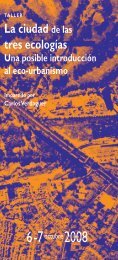Lanzarote: el papel de la crisis - Fundación César Manrique
Lanzarote: el papel de la crisis - Fundación César Manrique
Lanzarote: el papel de la crisis - Fundación César Manrique
You also want an ePaper? Increase the reach of your titles
YUMPU automatically turns print PDFs into web optimized ePapers that Google loves.
consumption of resources and the size of the popu<strong>la</strong>tion on the other. It is obvious that there<br />
is no room for the production of waste in a situation like this. It probably did not exist at<br />
all, not even as a concept. In this, the majos were ahead of their time.<br />
For six centuries, the culture of equilibrium has been maintained although it has, slowly but<br />
sur<strong>el</strong>y, been leaning towards a greater bur<strong>de</strong>n on the territory and less productive<br />
diversification. In 1950, <strong>Lanzarote</strong> accommodated 25,000 people on a highly s<strong>el</strong>f-sufficient<br />
productive foundation, whereby resources were put to use wis<strong>el</strong>y, producing hardly any<br />
waste other than that which was easily <strong>de</strong>gradable and could be ploughed back into the<br />
environment. At the time, which is not so very long ago, the ínsu<strong>la</strong> <strong>de</strong> Lanc<strong>el</strong>ott was still an<br />
idyllic <strong>de</strong>stination for a tourism that was practically non-existent. Income was as low as<br />
pollution and history, as unknown as experienced. The biosphere was still <strong>la</strong>cking in reserves.<br />
Over the <strong>la</strong>st few <strong>de</strong>ca<strong>de</strong>s new publishers and distributors of maps better known than Ang<strong>el</strong>ino<br />
Dubert’s have presented the ínsu<strong>la</strong> <strong>de</strong> Lanc<strong>el</strong>ott to the world. In a very short time, present-day<br />
tourist-adventurers, also from the north, have, thanks to their surplus income, progressiv<strong>el</strong>y<br />
turned the beautiful insu<strong>la</strong>r p<strong>la</strong>teau into the <strong>de</strong>ck of a gigantic, luxury aircraft carrier anchored<br />
in the At<strong>la</strong>ntic, and its unstable ba<strong>la</strong>nce <strong>de</strong>pends, almost exclusiv<strong>el</strong>y, on exotic factors.<br />
In less than half a century, the cultivable surface area and hence, s<strong>el</strong>f-sufficiency, has<br />
diminished to negligible lev<strong>el</strong>s: a meagre four p.c. of the is<strong>la</strong>nd’s total. Depen<strong>de</strong>nce on the<br />
exterior for water3 and energy is even greater, practically total. Every year, over one- and-ahalf<br />
million new tourists are drawn by this huge, ecologically atilt, luxury aircraft carrier, where<br />
they satisfy their exotic needs in an increasingly fragile, unba<strong>la</strong>nced environment. To enable<br />
them to do so, every year, 35,000 aircraft trav<strong>el</strong>ling 214 million kilometres are required, along<br />
with 1,800 ships, carrying 800,000 tonnes of materials, foodstuffs, water and fu<strong>el</strong>s.<br />
This economic miracle, bringing income lev<strong>el</strong>s that were inconceivable only 50 years ago,<br />
entails an ecological cost even more inconceivable for the same 25,000 inhabitants of 1950.<br />
Half-a-million tonnes of carbon dioxi<strong>de</strong>, together with smaller, though far more dangerous<br />
amounts of other atmospheric contaminants, are ad<strong>de</strong>d annually to the 160,000 tonnes of<br />
solid waste as a result, or through the transformation of, the <strong>la</strong>rge and costly external supply<br />
of food, materials and energy.<br />
Essentially, this economic mod<strong>el</strong> produces income and waste, coupled with an enormous,<br />
an abysmal imba<strong>la</strong>nce between knowledge, willingness and the capacity to administer and<br />
234<br />
3 This is because all water<br />
consumed is previously<br />
<strong>de</strong>salinated, using imported fossil<br />
energy (hydrocarbons).


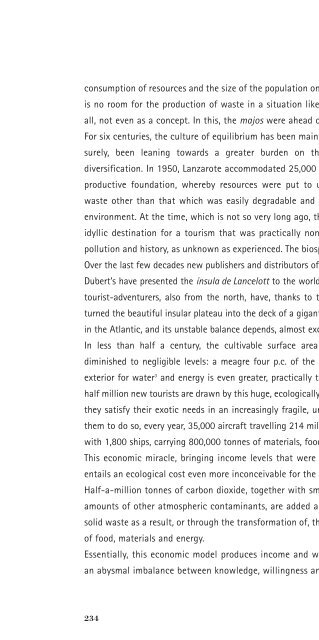

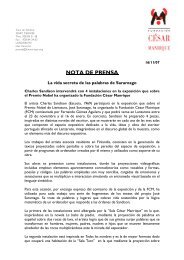
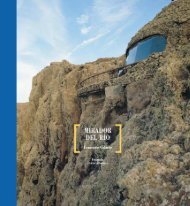

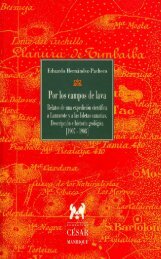


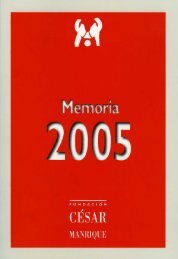
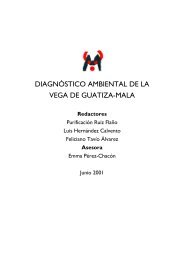
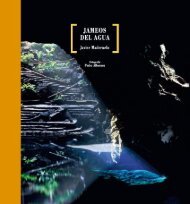
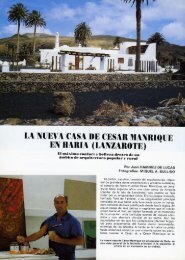

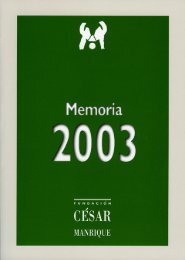
![Becas y premios de la Fundación César Manrique [1997-2006]](https://img.yumpu.com/20766851/1/184x260/becas-y-premios-de-la-fundacion-cesar-manrique-1997-2006.jpg?quality=85)
